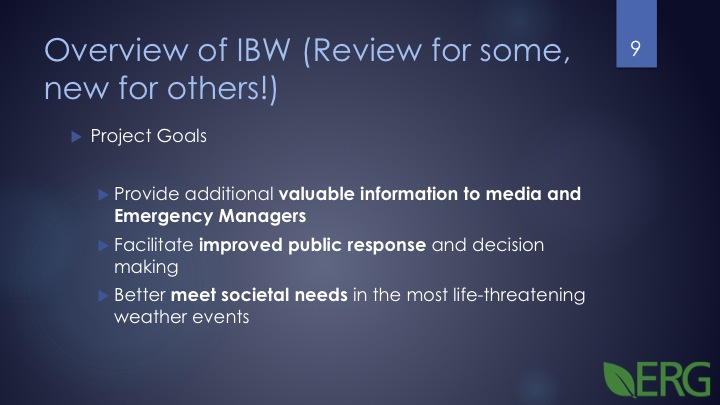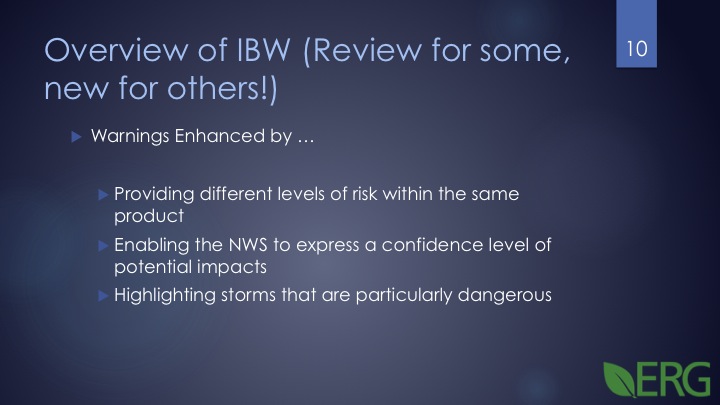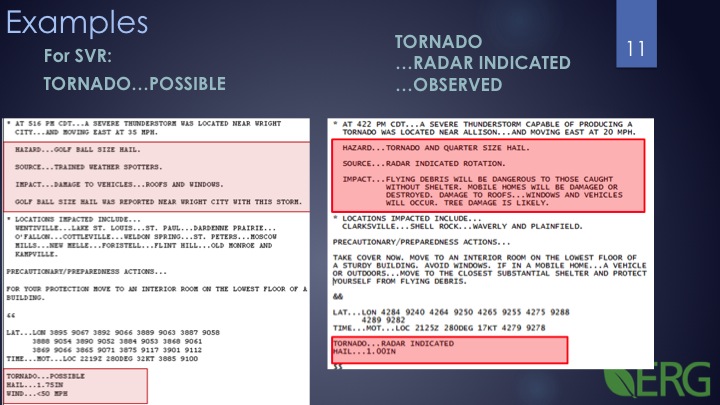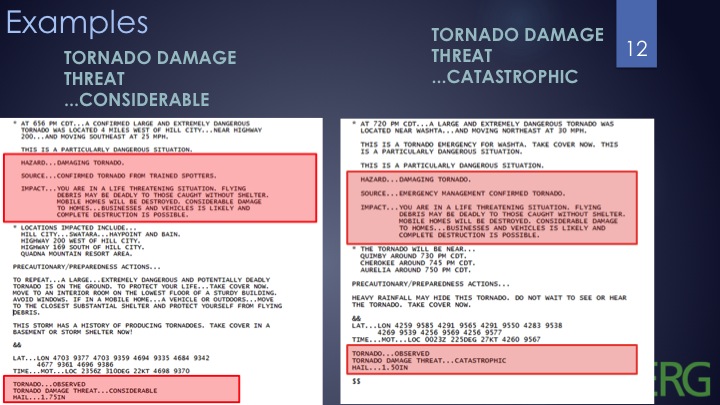Impact-based Warning Focus Group Guide
NOAA Customer Surveys
IBW Focus Group Guide
Impact-Based Warnings Research Project
OMB: 0648-0342
NOAA National Weather Service
Impact Based Warnings (IBW) Project
Part A and B DOC/NOAA Customer Survey Clearance
OMB Control No. 0648-0342
Expires 5/31/2018
Focus Group Guide on Severe Weather Communication
Welcome and thank you for joining us! This focus group is entirely voluntary, and you may decide to leave at any time. We’re excited to hear about your experiences. Before we get started, we will briefly introduce ourselves, explain the logistics of the focus group, and allow you all to introduce yourselves.
Paperwork Reduction Act Statement
Public reporting burden for this collection of information is estimated to average 2 hours per person, including the time for reviewing instructions, searching existing data sources, gathering and maintaining the data needed, and completing and reviewing the collection of information. Send comments regarding this burden estimate or any other suggestions for reducing this burden to Gina Eosco (703-841-1705, gina.eosco@erg.com)
Eastern Research Group will not release your name or information that could identify you as part of this focus group process or in our subsequent reports to NOAA NWS.
Notwithstanding any other provisions of the law, no person is required to respond to, nor shall any person be subjected to a penalty for failure to comply with, a collection of information subject to the requirements of the Paperwork Reduction Act, unless that collection of information displays a currently valid OMB Control Number.
Introductions
Go around the room and have everyone say their name and organization.
ERG gives background on project
Logistics
Describe focus group format
Announcements (location of restroom, tornado shelter, etc.).
Part 1. Weather Sources and Information about Severe Weather
Now we’d like to ask some general questions about the weather in your area.
Where do you go for information on severe weather, such as thunderstorms and tornadoes?
How much do you trust these sources, and why?
When you are accessing [listening/reading] your preferred weather source, how do you [learn about or differentiate] between a daily forecast and a significant weather event?
What words cue you that “today’s weather is different?”
Are there other verbal or non-verbal cues that indicate severe weather?
When you are accessing [listening/reading] your preferred weather source, how do you [learn about or differentiate] between an “every day storm” versus a potentially high impact storm?
When you receive a thunderstorm or tornado warning, what part of it are you paying attention to the most?
What type of information are you looking for?
What words or phrases convey levels of storm severity to you?
For example, for a Severe Thunderstorm?
For example, for Tornadoes?
What does severity mean to you? In other words, what metric or criteria are you basing severity on?
Impact area? Confirmed impacts?
Confirmed Damage to buildings or potential loss of life?
Population density?
Physical criteria such as wind strength, hail size?
What do you do differently knowing there is a higher level of severity compared to an every day storm?
What words or phrases convey urgency of action to you?
For example, taking action for a thunderstorm?
For example, taking action for a tornado?
What metric are you basing urgency on?
Intensity of the storm?
How close in time and space it is to you?
Part II. An Overview and Discussion about Impact Based Warnings.
Now we’d like to ask some questions about an NWS program called Impact Based Warnings. To make sure we’re all on the same page, we will provide a short power point overview, and then open it up for discussion.
By show of hands, are you familiar with the IBW program?
Have you experienced a severe thunderstorm or tornado warning that used this program?
If yes, could you please share with us how you used this information? (If no, ask the group to read over a tornado warning, and ask how they would use the information]
What decisions did you make from this information?
What does it communicate differently to you compared to just a tornado warning, for example?
[Show slide for Tags] What are your thoughts on the wording of the tags radar indicated, observed, considerable, and catastrophic?
Do these word choices convey levels of severity to you? Why or why not?
What do you perceive as the difference between considerable versus catastrophic?
Do these word choices convey urgency of action to you? Why or why not
Do you have alternatives?
[Show slide for Impact Statements] What are your thoughts on this wording?
Would you read this during a storm? Is it helpful?
How would you use it?
Any suggestions for changing it?
Is it needed?
Do you have any suggestions for improving the IBW program?
Appendix – Power Point Slides on IBW




| File Type | application/vnd.openxmlformats-officedocument.wordprocessingml.document |
| Author | Gina Eosco |
| File Modified | 0000-00-00 |
| File Created | 2021-01-25 |
© 2026 OMB.report | Privacy Policy